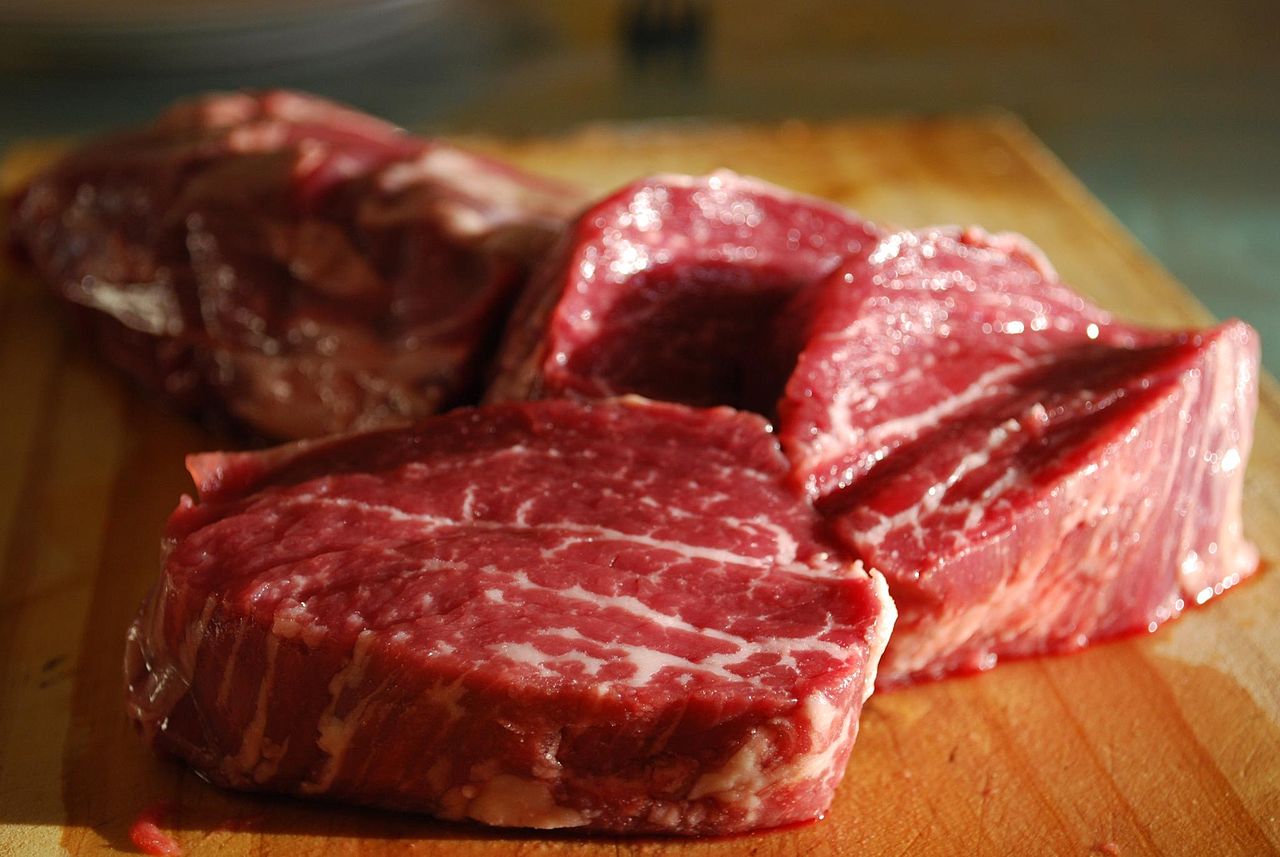Can Dogs Eat Beef Raw?

You may remember hearing the slogan, “Beef. It’s what’s for dinner”, which was a popular Cattlemen’s Beef Board advertising slogan. Beef, it’s a favorite meat for many people, so it’s not surprising that it’s a favorite among dogs as well. But if you’re feeding your dog commercial dog food or kibble, “where’s the beef?” might be more what your dog is thinking. Most commercial dog food is completely void of real beef and is made with grain or corn based fillers instead.
But dog lovers take heart. Raw beef is one of the proteins by pet owners that believe in a “raw diet”. There are several models of “raw diet” for dogs including the biologically appropriate raw food (BARF) model and the Prey model. The basic difference between the two models is that the BARF model includes a slightly lower percentage of muscle meat and includes fruits, vegetables, and dairy whereas the Prey model calls for a higher percentage of muscle meat and the belief that fruits, vegetables, and dairy are just fillers.
Both models include having dogs eat beef raw along with other raw meats such as lamb, duck, rabbit, sardines, elk, venison, and even green beef tripe (from the cow stomach). As with any other raw meat, freeze the beef for several weeks to one month before thawing and feeding to your dog to reduce any bacteria that may be present in the beef.
Why Feed a Raw Food Diet?
Many pet owners are switching to a raw diet for their dogs because it’s what dogs ate naturally before being domesticated. The grain and corn based ingredients that cause allergies and other chronic health problems for dogs are increasingly being revealed. A raw food diet that includes letting dogs eat beef raw is becoming more popular among owners who want to return their dogs to a more natural diet without all the harmful preservatives and additives.
Dogs who eat a raw food diet have healthier coats, they have smaller bowel movements, fewer allergy problems, healthier weight, and less frequent vet visits. We don’t recommend that you just fill your dog’s dish with raw beef. Instead it’s important to understand all the ins and outs of feeding your dog a raw food diet that includes raw beef. There are also places where you can buy pre-made raw beef for your dog that will include a combination of raw muscle meat, organs, and bones.
Can Dogs Eat Beef Rib Bones?
When it comes to beef rib bones and whether your dog can eat them, it really depends on your dog. The issue with letting dogs eat beef rib bones is, like with any bones, the risk of splintering. Although beef rib bones are less prone to splintering than cooked chicken or turkey bones, they can still splinter, especially when cooked. Also, never feed beef rib bones that are small enough for your dog to swallow as these can become lodged in the throat and cause a lot of grief for your dog.
Can Dogs Eat Prime Rib Bones?
When it comes to bones for dogs, it’s always better to be safe than sorry. This is also true for prime rib bones too. Even though prime rib bones may be less likely to splinter than cooked poultry or pork bones, any bone small enough to swallow can be dangerous for your dog. Large dogs would be able to crunch and maybe even swallow part or all of a prime rib bone. Smaller dogs may not be able to swallow them as easily but they would still be at risk of the prime rib bones splintering. A splintered bone can wreak havoc on your dog and cause damage to the mouth, teeth, and intestines.
If you absolutely must feed your dog prime rib bones, supervise your dog very carefully with a raw bone while they chew the meat from it and then take it away once they start to chew on the bone itself. Never feed cooked prime rib bones as the cooking process makes the bones more brittle and thus prone to splintering. The best way to let your dog eat prime rib bones would be to cut the raw meat off the bone and feed them the meat.
Keep in mind that some dogs don’t tolerate the fat content in beef as well as other proteins. Monitor your dog’s stools and other behaviors carefully. If they show any change in stool, such as diarrhea, more frequent stools, etc. or if they become lethargic or lose their appetite after chewing on a prime rib bone seek the advice of a veterinarian immediately.